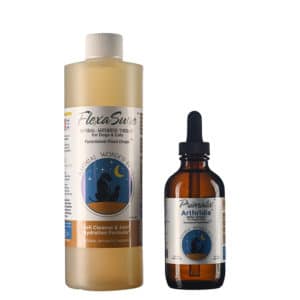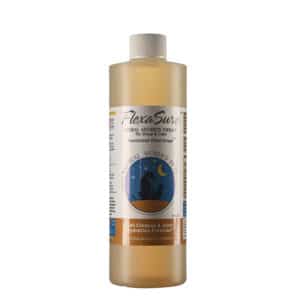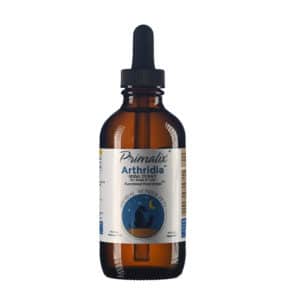FlexaSure & Primalix Arthridia
What is the Double Power Pack?
The Double Power Pack contains both Primalix Arthridia™ and FlexaSure™ products.
- Primalix Arthridia™ is a traditional holistic formula of natural root extracts that ancient healers of humans and animals used
- Contains stomach soothing effects of Ginger root
- Does not cause harm to stomach or intestines as do NSAIDs (non-steroidal-anti-inflammatory drugs)
- Easy to use Functional Food Drops that you add to your pet’s food or give orally FlexaSure™
- FlexaSure™ is a triple-stage formula that lets your dog or cat's own body work at the cellular level to cleanse, rehydrate (plump up), and fortify tissue
- Pleasant tasting liquid that dogs and cats enjoy in their food or when given directly
Key Benefits of Arthridia™
- A non-drug approach instead of using non-steroidal anti-inflammatory drugs (NSAIDs)
- Free of negative side effects or the long-term damage of conventional medication
- Extremely well tolerated and has stomach soothing qualities
- Natural ingredients have been used for thousands of years and are known to be safe and effective
Key Benefits of FlexaSure™
- Cells can more easily eliminate toxins and absorb nutrients
- Delivers an average of 1,000 milligrams (one gram) of MSM per day as opposed to 250 to 500 milligrams of MSM depending on body weight from most other supplements
- Liquid formula is much more bioavailable than supplements in pill form
All ingredients are Certified Organic or wild harvested from indigenous lands.
Ingredients of Primalix Arthridia™
The following roots belong to a small group of herbs used in Naturopathic clinical practice on patients with autoimmune diseases like rheumatoid arthritis, lupus, and Fibromyalgia. They have been used for thousands of years in their native cultures in traditional Chinese medicine or by indigenous tribes of Central and South America. Modern clinical studies are proving the value of these incredible tubers.
Rehmannia root has been shown in animal models to reduce inflammation by affecting the central nervous system immune cells called astrocytes (Kim et al., 1999). The study found that Rehmannia stimulates the production of beneficial and soothing adrenal cortical hormones.
Bupleurum has been cited in clinical studies to act on the liver, increasing protein synthesis. It also inhibits the production of messenger molecules known as prostaglandins, which are produced throughout the body and cause the inflammatory response and the sensation of pain.
Sarsaparilla is an effective ancient remedy for rheumatism and blood purification, a muscle builder and booster of stamina and energy. Furthermore, it is known to have antibacterial and anti-inflammatory constituents that are highly valuable in cases of cat and dog arthritis. The diffuse beneficial effects of this root have a wide range of positive influences on rheumatic conditions.
Ginger is well known for being a stomach soother and effective stabilizer for motion sickness and other digestive imbalances. Ginger is often prescribed by herbalists for its powerful anti-inflammatory effects inhibiting both cyclooxygenase (COX) and lipoxygenase (LOX) as well as prostaglandins, the messengers of pain, so that your pet experiences a level of wellness naturally absent of inflammation and pain. Unlike NSAIDs, this natural plant root does not cause stomach ulcers and bleeding.
Ingredients in FlexaSure™
Methylsulfonylmethane (MSM) Is the leading active ingredient in FlexaSure™. This is the same natural sulfur that is commonly found in glucosamine and chondroitin supplements for dog arthritis. FlexaSure™, however, contains a much higher quantity of MSM than most supplements: an average of 1,000 milligrams (one gram) per day as opposed to 250 to 500 milligrams of MSM depending on body weight from most supplements. Furthermore, FlexaSure™ is five times more bioavailable to your dog than pills.
MSM is one of the most abundant natural compounds in the body, with toxicity equated to clean drinking water, so you don't need to worry about giving high doses to your pet.
MSM (and its cousin DMSO) was the focus of extensive clinical studies on over 12,000 patients by Harvard Medical Researcher Stanley W Jacob, MD. His findings and other research data confirm that, based on the amount and bioavailability of MSM in FlexaSure it:
- Permeates cell walls so that natural, essential fluids can wash away lactic acid and toxins that make joints and muscles painful
- Rejuvenates tissue cells as healthy nutrients are readily absorbed through cell walls
- MSM is responsible for the creation of new muscles, restored collagen, and the capacity to naturally rebuild cartilage
Chinese skullcap (Scutellaria baicalensis) contains clinically confirmed anti-arthritic and anti-inflammatory effects. Ancient as well as modern medical pharmacopoeia find its therapeutic effects are equal to prescription drugs like phenylbutazone and indomethacin but with none of the negative side effects. These therapeutic effects are due to a high content of flavonoid molecules which are potent antioxidants and scavengers of free radicals.
Hyaluronic acid is a protein component of connective tissue. This water holding molecule is found in the synovial fluid of all your dog's joints, cartilage and skin tissue. It fills the space between cells in connective tissue and provides the cushioning that allows joints to bend and flex. The ingredients in FlexaSure™ are preserved in a 50% solution of liquid hyaluronic acid, providing 24 milligrams of dog arthritis fighting hyaluronic acid per day.
Dosing Instructions for Arthridia™
- Cats and small dogs (up to 20 lbs.): 1/2 dropper twice daily
- Medium dogs (21 to 60 lbs.): 1 dropper twice daily
- Large dogs (61 to 100 lbs.): 2 droppers twice daily
- Giant dogs (101 lbs. and up) 3 droppers twice daily
Add to food or insert dropper into pet's mouth and discharge.
NOTE: One "dropper" equals one squeeze of the black bulb (1.0mL), which fills the pipette about half full. Refrigerate after opening.
CAUTION: Not recommended for dogs with Cushing's syndrome.
Dosing Instructions for FlexaSure™
- Cats and small Dogs (under 20 lbs.) 1/2 teaspoon twice daily
- Medium Dogs (21 to 60 lbs.) 1 teaspoon twice daily
- Large Dogs (61 to 100 lbs.) 2 teaspoons twice daily
- Giant Dogs (101 lbs. and up) 3 teaspoons twice daily
Dog Arthritis and Cat Arthritis
Discover Nature's Double Power Pack
Dog arthritis brings on the swollen joints, stiffened hips, and aching legs and paws that can turn a puppy into a dog. What can nature do to help?
Dog arthritis and arthritis in cats present one of the most difficult problems facing pet owners today. Our pets are living longer and we love them as family more than ever before. Seeing our beloved pets’ already too short lives crippled by arthritis is heartbreaking.

A Natural Consequence of Age?
Many of us think of arthritis in our pets as well as in ourselves as being a necessary degenerative process of aging. When arthritis hits, many of us accept that the happy days of running and playing with our pets are over. In fact, neither type of arthritis needs to be a part of your pet’s life.
Two Kinds of Arthritis
Both types of arthritis tend to occur with age, but the age at which they occur varies dramatically and many pets are never affected by cat or dog arthritis at all. Arthritis has been tied to an overreaction of the immune system and may be considered an autoimmune disorder that occurs when the body has been invaded by allergens over time.
Osteoarthritis (OA) – often referred to as Degenerative Arthritis – Occurs when the cartilage that cushions the joints breaks down, causing the bones to grind painfully against one another. This is the most common form of arthritis in dogs.
Rheumatoid arthritis (RA) is a long-term inflammatory disorder that affects the joints of your dog's hips, legs, and paws. This autoimmune disease causes intense pain and swelling that may even result in erosion of the bone and deformity of the joints. RA can also affect the lungs, heart, and other organs.
Conventional Treatment for Dog Arthritis
We may turn to conventional veterinary medicine for a solution, but the medications prescribed for dog arthritis may be so detrimental to your pet's health that you wonder if you're doing more harm than good.
- NSAIDs are the most common group of pain-killing medications used to alleviate cat and dog arthritis pain. These medications can cause side effects that affect your dog or cat's quality of life, like vomiting, diarrhea, constipation, and fluid retention (Edema). These drugs may also negatively affect their life because they may cause ulcers and kidney or liver failure.
- Artificial corticosteroids work by suppressing your pet’s immune system thereby decreasing inflammation and pain. The negative effects of a decreased immune system are extensive. Your dog will be more likely to get diabetes or cataracts, go blind due to glaucoma, and suffer from high blood pressure. Furthermore, steroids cause a range of negative behavioral health and lifestyle effects like weight gain, excessive barking, and aggressive behavior.
- Injections of hyaluronic acid can add cushioning synovial fluid into your dog's joints, but the injections are painful and their effects temporary.
Addressing Cat and Dog Arthritis
There are two major goals in any treatment of arthritis:
- Alleviate pain associated with arthritis so that your dog can live a comfortable life
- Cushion joints so that bones do not deteriorate and the disease cannot progress
Two distinct goals deserve a two-pronged attack! Here are two dietary supplements that work together to provide an effective, natural approach to cat and dog arthritis without the negative side effects of conventional medication.
Arthridia™ is a safe and effective herbal extract formula in convenient Functional Food Drops that can be given to all dog and cat breeds, without stomach upset.
FlexaSure™ is a proprietary three-stage formula that lets your pet's own body work on the cellular level to hydrate and fortify tissue.



